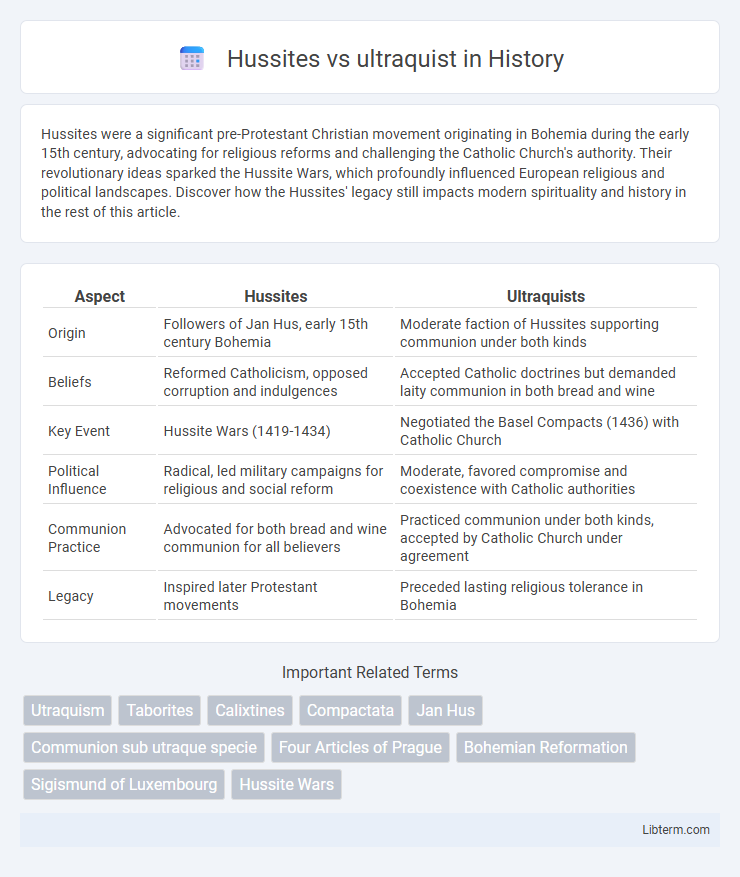Hussites were a significant pre-Protestant Christian movement originating in Bohemia during the early 15th century, advocating for religious reforms and challenging the Catholic Church's authority. Their revolutionary ideas sparked the Hussite Wars, which profoundly influenced European religious and political landscapes. Discover how the Hussites' legacy still impacts modern spirituality and history in the rest of this article.
Table of Comparison
| Aspect | Hussites | Ultraquists |
|---|---|---|
| Origin | Followers of Jan Hus, early 15th century Bohemia | Moderate faction of Hussites supporting communion under both kinds |
| Beliefs | Reformed Catholicism, opposed corruption and indulgences | Accepted Catholic doctrines but demanded laity communion in both bread and wine |
| Key Event | Hussite Wars (1419-1434) | Negotiated the Basel Compacts (1436) with Catholic Church |
| Political Influence | Radical, led military campaigns for religious and social reform | Moderate, favored compromise and coexistence with Catholic authorities |
| Communion Practice | Advocated for both bread and wine communion for all believers | Practiced communion under both kinds, accepted by Catholic Church under agreement |
| Legacy | Inspired later Protestant movements | Preceded lasting religious tolerance in Bohemia |
Origins of the Hussite Movement
The Hussite Movement originated in the early 15th century as a reformist Christian group inspired by the teachings of Jan Hus, who criticized the Catholic Church's corruption and called for ecclesiastical reforms. The movement split into various factions, with the Ultraquists advocating for receiving communion under both kinds (bread and wine) for laypeople, reflecting a moderate reform stance. This division marked crucial ideological differences that shaped the religious and political conflicts in Bohemia during the Hussite Wars.
Defining Hussite Beliefs
Hussite beliefs centered on the need for church reform, emphasizing communion under both kinds (bread and wine) for all believers, opposition to indulgences, and a call for clerical morality. Ultraquists, a moderate faction within the Hussite movement, insisted on maintaining the Latin Mass and church hierarchy while advocating communion in both kinds as a minimum reform. The theological divide between radical Hussites, who rejected many Catholic doctrines, and ultraquists shaped the religious and political conflicts of 15th-century Bohemia.
Emergence of the Ultraquists
The Ultraquists emerged in the early 15th century as a moderate faction within the Hussite movement, advocating for communion under both kinds--bread and wine--for the laity, in contrast to the more radical Taborites. Their name derives from the Latin "sub utraque specie," meaning "under both kinds," symbolizing their primary theological demand. This faction sought to reform the Catholic Church while maintaining certain traditional elements, leading to significant influence in Bohemian religious and political affairs during the Hussite Wars.
Core Theological Differences
The core theological differences between Hussites and Ultraquists centered on the nature of the Eucharist and church authority. Hussites, following Jan Hus, emphasized the laity's right to receive both bread and wine, challenging the Catholic doctrine of communion under one kind. Ultraquists, a moderate Hussite faction, accepted this practice but maintained a more conservative stance on church hierarchy and doctrinal conformity, seeking reform within the church rather than outright rejection.
Leadership and Key Figures
The Hussite movement was led primarily by Jan Zizka, a legendary military commander who introduced innovative tactics and unified diverse factions against external threats. Ultraquists, a moderate wing of the Hussite movement, were represented by figures like Jacobellus of Mies, advocating reconciliation with the Catholic Church while maintaining some reformist principles. Leadership within the Hussite wars fluctuated between radical military strategists and more conciliatory religious leaders, shaping the movement's direction and legacy.
Religious Practices and Rituals
Hussites emphasized communion in both kinds, allowing laity to receive both bread and wine, contrasting with the ultraquists who strictly maintained traditional Catholic mass rituals but permitted lay chalice communion as a compromise. Hussites integrated Czech language into services, promoting vernacular preaching and scripture reading, while ultraquists balanced Latin liturgy with vernacular elements. Both groups rejected the Catholic doctrine of transubstantiation but diverged in ritual flexibility, with Hussites advocating for more radical liturgical reforms.
Political Alliances and Conflicts
The Hussites, primarily represented by the radical Taborites, opposed the moderate Ultraquists who favored negotiation with the Catholic Church, resulting in fluctuating political alliances during the Hussite Wars (1419-1434). The Ultraquists aligned with moderate nobles and foreign powers like Poland, seeking reform within the Catholic framework, while the Hussites built coalitions based on religious and social reforms, leading to internal conflicts and shifting loyalties. These divergent political strategies and alliances intensified factionalism, shaping the complex conflict between revolutionary and conciliatory forces in Bohemia.
Impact on Bohemian Society
The conflict between the Hussites and Ultraquists profoundly reshaped Bohemian society by challenging established religious authority and promoting early ideas of religious reform. The Hussite movement fostered increased literacy and the use of the Czech language in religious texts, which strengthened national identity and cultural cohesion. Socio-political tensions resulting from the rivalry accelerated reforms that influenced Bohemian governance and contributed to the broader Protestant Reformation in Europe.
Lasting Legacy in European Christianity
The Hussites and Ultraquists significantly influenced European Christianity by challenging established Catholic doctrines and promoting early reformist ideas that predated the Protestant Reformation. Their advocacy for receiving both the bread and wine in Communion laid foundational principles for later Protestant sacraments and ecclesiastical reforms. This lasting legacy contributed to religious pluralism and the reshaping of Christian liturgical practices across Europe.
Modern Perspectives on the Hussites and Ultraquists
Modern perspectives on the Hussites and Ultraquists emphasize their critical role in shaping early Protestantism and Czech national identity. Scholars highlight the Hussites' radical social and religious reforms contrasted with the Ultraquists' more moderate stance, advocating for communion under both kinds as a compromise within the Catholic Church. Contemporary research explores their influence on later Reformation movements and their legacy in promoting religious tolerance and national sovereignty in Central Europe.
Hussites Infographic

 libterm.com
libterm.com